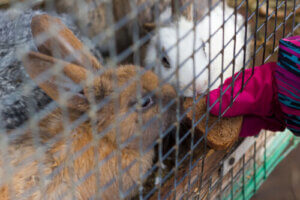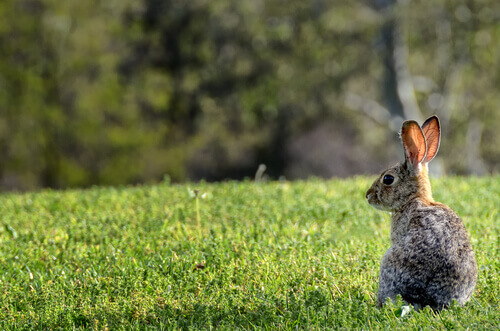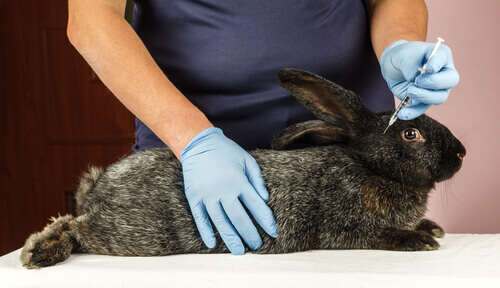Aggression in Rabbits: Why it Happens and How to Solve It

People started keeping rabbits as pets not that many years ago and, because of this, there may be a series of behaviors that we don’t yet understand: aggression in rabbits is one of them. Today, we’re going to talk about its causes and what you can do to help your rabbit.
Are rabbits aggressive?
If you were thinking about adopting a rabbit and you’ve heard about aggression in rabbits, you may want to back off. However, you can rest assured that rabbits aren’t generally aggressive. On the contrary, they’re very loving animals and very suitable as pets.
In addition to their tender character, they’re easy to train and are quite clean. Similar to cats, they’re used to grooming various areas of their body. They just need you to clean their cage every day and give them a lot of cuddles, which seems even easier than having a dog or a cat.
Why may aggression appear in rabbits?
So, if rabbits have a friendly and tender character, what causes this aggression in them? One of the main causes is their territorial behavior.

Rabbits are territorial animals as is the case with dogs and cats. So, when we try to invade what they consider their territory, aggressive behaviors can arise. Therefore, while the rabbit is in its cage, we should respect its space and not force it out, nor touch its things like its feeders or water.
The best cages for rabbits in order to avoid this from happening are those which have a front door that can be opened allowing the rabbit to go out alone when it wishes. Otherwise, if you try to get your hand into its territory (its cage), it’ll most likely try to attack you. You or anyone else who does it, of course.
More causes of aggression in rabbits
In addition to the above mentioned, there are other main causes of aggression in rabbits, such as:
- Little contact with humans. Every animal that is adopted as a pet should be socialized in order to ensure good behavior with other pets and people in the future. If a rabbit hasn’t gone through a process of socialization from a young age, it’ll very probably become aggressive.
- Poor treatment. If your rabbit comes from an animal shelter, it was probably there because it was abandoned or abused. This could have created a distrust towards humans, and could make the animal aggressive.
- Sexual behavior. An unsatisfied sexual desire can make your rabbit nervous and awaken its aggressiveness.

What to do if your rabbit is aggressive?
Having identified the causes, you should know what you can do to make your rabbit less aggressive. Here are some things within your grasp:
- Analyze its space. A rabbit, like any other pet, needs its space, as we’ve already said before. It needs a place which it may consider its territory. This must be in optimum conditions, in terms of size, location and temperature. Thus, make sure that your rabbit feels comfortable in the place that it inhabits, and that it has everything it needs to feel at home.
- Castrate it. One of the main reasons for aggression is sexual desire. Therefore, if you castrate your rabbit, it’s very likely that the problem will end.
- Treat it with love. If the aggressiveness has been born from poor treatment, there’s only one antidote: love. Speak lovingly to your new pet, caress it, treat it with love. You’ll see that, little by little, you’ll gain its trust.
- Give it space. We already know that you would love to cuddle your rabbit all day long, but as you’ve seen, it doesn’t like to feel invaded, so the best thing is to give it space and allow it to come to you when it’s ready.
If you think your rabbit is aggressive, analyze the causes and try to do your part to help it by taking into account the aforementioned advice. If it doesn’t work, see your vet to determine other causes, which could perhaps be more serious.
People started keeping rabbits as pets not that many years ago and, because of this, there may be a series of behaviors that we don’t yet understand: aggression in rabbits is one of them. Today, we’re going to talk about its causes and what you can do to help your rabbit.
Are rabbits aggressive?
If you were thinking about adopting a rabbit and you’ve heard about aggression in rabbits, you may want to back off. However, you can rest assured that rabbits aren’t generally aggressive. On the contrary, they’re very loving animals and very suitable as pets.
In addition to their tender character, they’re easy to train and are quite clean. Similar to cats, they’re used to grooming various areas of their body. They just need you to clean their cage every day and give them a lot of cuddles, which seems even easier than having a dog or a cat.
Why may aggression appear in rabbits?
So, if rabbits have a friendly and tender character, what causes this aggression in them? One of the main causes is their territorial behavior.

Rabbits are territorial animals as is the case with dogs and cats. So, when we try to invade what they consider their territory, aggressive behaviors can arise. Therefore, while the rabbit is in its cage, we should respect its space and not force it out, nor touch its things like its feeders or water.
The best cages for rabbits in order to avoid this from happening are those which have a front door that can be opened allowing the rabbit to go out alone when it wishes. Otherwise, if you try to get your hand into its territory (its cage), it’ll most likely try to attack you. You or anyone else who does it, of course.
More causes of aggression in rabbits
In addition to the above mentioned, there are other main causes of aggression in rabbits, such as:
- Little contact with humans. Every animal that is adopted as a pet should be socialized in order to ensure good behavior with other pets and people in the future. If a rabbit hasn’t gone through a process of socialization from a young age, it’ll very probably become aggressive.
- Poor treatment. If your rabbit comes from an animal shelter, it was probably there because it was abandoned or abused. This could have created a distrust towards humans, and could make the animal aggressive.
- Sexual behavior. An unsatisfied sexual desire can make your rabbit nervous and awaken its aggressiveness.

What to do if your rabbit is aggressive?
Having identified the causes, you should know what you can do to make your rabbit less aggressive. Here are some things within your grasp:
- Analyze its space. A rabbit, like any other pet, needs its space, as we’ve already said before. It needs a place which it may consider its territory. This must be in optimum conditions, in terms of size, location and temperature. Thus, make sure that your rabbit feels comfortable in the place that it inhabits, and that it has everything it needs to feel at home.
- Castrate it. One of the main reasons for aggression is sexual desire. Therefore, if you castrate your rabbit, it’s very likely that the problem will end.
- Treat it with love. If the aggressiveness has been born from poor treatment, there’s only one antidote: love. Speak lovingly to your new pet, caress it, treat it with love. You’ll see that, little by little, you’ll gain its trust.
- Give it space. We already know that you would love to cuddle your rabbit all day long, but as you’ve seen, it doesn’t like to feel invaded, so the best thing is to give it space and allow it to come to you when it’s ready.
If you think your rabbit is aggressive, analyze the causes and try to do your part to help it by taking into account the aforementioned advice. If it doesn’t work, see your vet to determine other causes, which could perhaps be more serious.
All cited sources were thoroughly reviewed by our team to ensure their quality, reliability, currency, and validity. The bibliography of this article was considered reliable and of academic or scientific accuracy.
- Fusi, A. (1994) El comportamiento sexual del conejo. Coniglicoltura, 31(8), 31-33.
- Colegio Oficial de Veterinarios de Madrid. (2015) Recomendaciones al adoptante. Recuperado el 17 de marzo de 2018, disponible en: https://www.colvema.org/pdf/CONEJOSOK.pdf
This text is provided for informational purposes only and does not replace consultation with a professional. If in doubt, consult your specialist.








